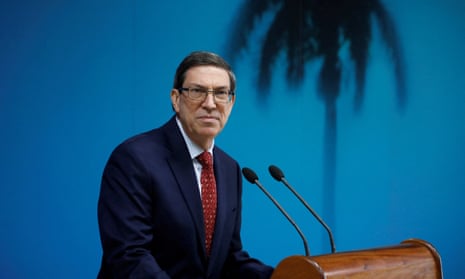Cuba has uncovered a human trafficking ring aimed at recruiting Cubans to fight as mercenaries for Russia in its war in Ukraine, its foreign ministry has said, as Moscow seeks to increase the size of its forces.
In a statement, the Cuban foreign ministry said the authorities were working to “neutralise and dismantle” the network, which it said was operating within the Caribbean island nation and in Russia.
“The ministry of the interior … is working on the neutralisation and dismantling of a human trafficking network that operates from Russia to incorporate Cuban citizens living there, and even some from Cuba, into the military forces participating in war operations in Ukraine,” the ministry statement said.
“Cuba has a firm and clear historical position against the use of mercenaries … Cuba is not part of the war in Ukraine.”
The foreign ministry did not comment on whether any Cubans joined the war in Ukraine as part of the trafficking ring, or if the ring had any connections to the Russian government.
Last May the Russian regional newspaper Ryazan Gazette said “several Cuban citizens” had signed up with the Russian forces fighting in Ukraine, but it was not clear if the Cuban foreign ministry statement is linked to the reports in Ryazan Gazette.
The invasion of Ukraine has resurrected a former cold war alliance between an increasingly isolated Russia and an impoverished Cuba. Havana’s public statements on Monday are a rare moment of friction between the two countries.
There has not yet been a response from Moscow. Russia has used mercenaries as part of its war effort, most notably the Wagner group.
Communist-run Cuba, traditionally a close ally of Russia, has previously criticised the west for provoking the war in Ukraine while its president, Miguel Díaz-Canel, said Russia enjoys “Cuba’s unconditional support” in its “clash with the west”.
Russia for its part has suggested placing arms in Cuba if talks with the west on European security and Ukraine fail to go its way.
The Cuban allegations come amid Russian attempts to boost the size of its armed forces as it seeks to continue the fighting in Ukraine. Andrey Gurulev, a lawmaker and retired military officer, said the defence ministry was aiming to recruit another 140,000 Russian soldiers by the end of the year.
To meet this goal, Russia has been luring migrants from central Asia to join the conflict in Ukraine with promises of quick citizenship and payments.
Meanwhile, the Kremlin on Tuesday declined to comment on reports that the North Korean leader, Kim Jong-un, planned to travel to Russia this month to meet Vladimir Putin and discuss supplying Moscow with weapons for Ukraine.
“No, we cannot [confirm this],” Kremlin spokesperson Dmitry Peskov said when he was asked if Kim would meet Putin soon. “We have nothing to say on this.”
On Monday, the New York Times reported that Kim plans to travel to Vladivostok, a port city not far from North Korea, where the two leaders would discuss Kim’s sending Russia artillery shells and anti-tank missiles in exchange for Moscow’s advanced technology for satellites and nuclear-powered submarines.
While Peskov did not comment on the reported meeting with Kim, the Kremlin did say Putin was planning to travel to Vladivostok next week to take part in the annual Eastern Economic Forum.
after newsletter promotion
The US has previously voiced concerns that arms negotiations between the two countries were advancing.
“We know that, at the very least, they’re interested in artillery ammunition particularly. But we also have information that they’re seeking other types of munitions to assist their war in Ukraine,” the White House national security spokesperson, John Kirby, said last week.
David Silbey, an associate professor of history at Cornell University specialising in military history, defence policy and battlefield analysis, said the best estimate is that Russian forces are firing “20,000+ artillery shells a day, a rate that burns through their production enormously quickly”.
“The result is that they’re looking anywhere for shells (and ammunition generally) and North Korea actually has a fairly substantial production capability, a legacy of their long cold war with South Korea over the demilitarised zone.”
Similarly to its relationship with Cuba, Russia’s war in Ukraine has brought Moscow closer to North Korea, partly re-establishing the cold war alliance that unravelled when the Soviet Union fell.
Russia’s eagerness to engage with North Korea also suggests Moscow is running low on stocks of some advanced weapons, as the war in Ukraine enters its 559th day.
In July, the country’s defence minister, Sergei Shoigu, travelled to Pyongyang, where he toured a defence exhibition that featured the North’s banned ballistic missiles.
